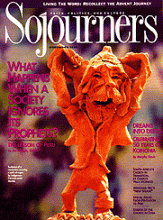Way back on his Born in the U.S.A. album, Bruce Springsteen sang a song about his rock-and-roll youth called "No Surrender." In the song he noted that he and his buddies had "learned more from a three minute record than we ever learned in school." Some critics took Springsteen to task for that line. They thought it would discourage kids from staying in school. "That must have been a really good record," they sniffed sarcastically. To which the obvious answer came, from critic Dave Marsh, "No, it was probably just a really bad school."
Well, I'd say that for the duration of the Reagan-Bush era I learned more about my country from Entertainment Tonight than I did from the CBS Evening News and McNeil-Lehrer combined. Now that might be because I watched ET more often than I did those other folks. But there's more to it than that. Entertainment Tonight, the half-hour syndicated show-biz and pop-culture news program, reflects America more clearly than does its real-news counterparts because it covers the world from where America lives - the sofa. It reports on the world you would live in if you really had your whole life free for the pursuit of amusement.
For the uninitiated, Entertainment Tonight follows the format of a real news show. It has two anchorpeople at a desk - John Tesh and Mary Hart - plus standby Leeza Gibbons. They read copy and set up video pieces that feature interviews with actors, musicians, directors and writers about their latest work, or their career aspirations, or their latest mid-life crisis, or whatever.
Read the Full Article

